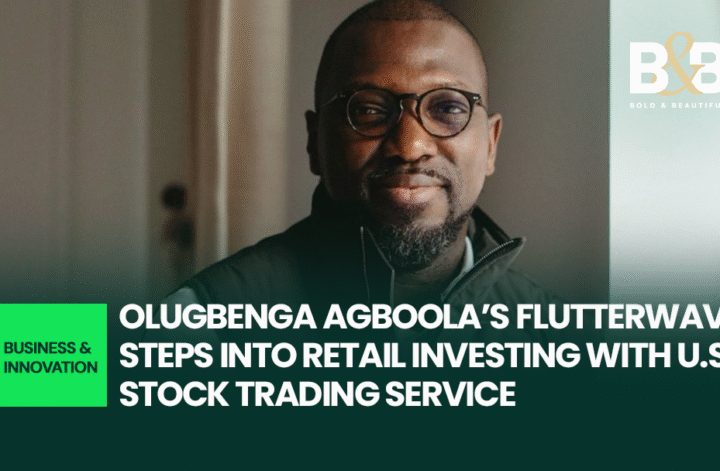Flutterwave has introduced a U.S. stock trading service, signalling a deliberate push beyond payments into retail investing. The move places Olugbenga Agboola’s company in a growing lane where African fintechs link everyday savers to American equities through simple, mobile-first rails.
The rollout frames Flutterwave’s consumer strategy with clearer edges. For years the company has been known for infrastructure that helps global merchants accept and settle payments across Africa. It added remittances through Send, creator tools through Disha and currency exchange through Swap. A regulated path to U.S. shares now adds a portfolio product that sits naturally alongside those money-in and money-out use cases.

Access is the story. Millions of Africans already move funds across borders to support family, pay fees or build savings. A stock feature tied to an existing wallet shortens the distance between a transfer and an investment. It also gives diaspora users a single entry point for sending money home while building exposure to well-known American names.
Execution will rest on licensing and partnerships. Stock trading into the U.S. market requires broker-dealer infrastructure, custody and compliance that meet American rules as well as local regulations in each African market. Flutterwave has the distribution and engineering strength to stitch those pieces together. The company will still need clear guardrails on onboarding, disclosures, tax forms and investor education before it scales at pace.
Competition looks active and instructive. Nigerian users already recognise homegrown investing brands that route trades to U.S. markets. Regional super-apps in East and Southern Africa have tested savings and wealth features with mixed results. Flutterwave’s advantage sits in its merchant network, remittance corridors and brand familiarity. If conversion costs stay low and funding flows remain seamless, the company can turn a large payments footprint into steady investing volumes.
The timing aligns with market demand. Inflationary pressure across several African economies has pushed savers to seek value preservation outside local currency. Dollar assets offer a hedge, even for small, periodic purchases. A fractional trading experience within a trusted app lowers psychological and technical barriers for first-time investors.

Risk management will sit beside access. Volatile equities, currency swings and scam exposure all heighten the need for plain-language guidance. Strong KYC, two-factor authentication and transparent fee schedules will shape user trust. Clear service limits per jurisdiction will matter as much as sleek product design.
For Flutterwave, this step deepens a transition from being only a payments processor to running a consumer finance ecosystem. The company’s next test will be measured by retention, average balance per user and the quality of its investor support rather than sign-up spikes. If those numbers hold, the product can settle into a durable second engine for growth.





